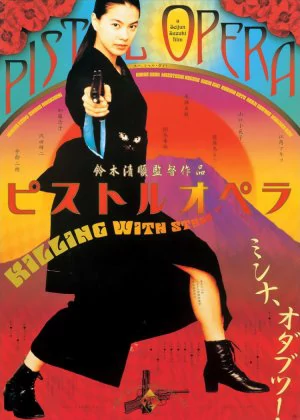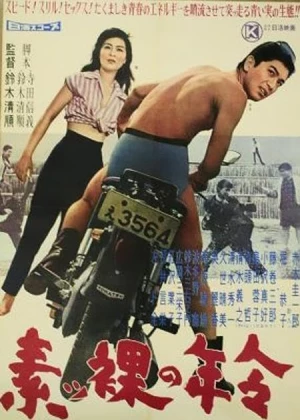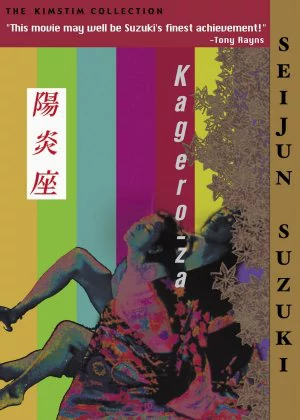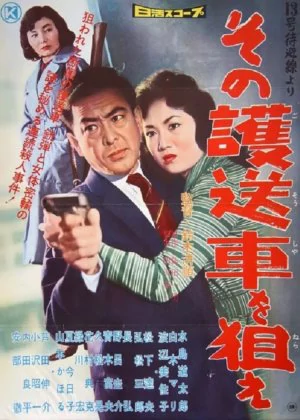
Japanese maverick director with an inimitable oeuvre. An amiable man and a proponent of style over substance cinema. I'm not the biggest fan of his oldskool aesthetics, but required viewing for people with a taste for the weird.
Movies

Pistol Opera is not the easiest of films. You have to accept that the story is a mere hook for some cinematic fun while Suzuki takes a little run with his audience.


One of Suzuki's better films. It's what more poetic than your average biography, leaning on beautiful imagery, a strong soundtrack and some trademark Suzuki weirdness. There's a little too much dialogue at times and the quality isn't entirely consistent, but there's plenty to like here, especially if you're a fan of Suzuki's more experimental side.

Ah, Seijun Suzuki. Not one of his most famous films, but don't ask me why. This one was a lot of fun, combining Suzuki's most experimental side with lots of winks, gags, and moments of frivolous lightness. It's not quite up there with his best work, but I sure enjoyed it immensely.
Read all
Suzuki pulls out all the stops. There's a strong visual playfulness, the plot is surprising and impossible to predict, and Suzuki has no trouble playing with people's expectations. It's not his most traditional narrative, but if you like Suzuki's lighter and more adventurous side, this is definitely worth checking out.
Lupin III: Legend of the Gold of Babylon

A typical Lupin adventure, made slightly more interesting by Seijun Suzuki's involvement and a very strong 70s vibe that runs through the film. It doesn't change too much about the core of Lupin though. Silly, over-the top action, a charming set of characters and one-dimensional bad guys. A fun diversion, but nothing more.

An interesting and short TV film/special from the hands of Seijun Suzuki. It's remarkable how much freedom he received to make this film. The production value is relatively low, but Suzuki was allowed to experiment with form as well as narrative here, which is when he's at his best.
Read all
The budget may have been limited, Suzuki made excellent use of the cinematography and the soundtrack to create a quirky and off-kilter atmosphere. The plot is fun, performances are decent, and the short runtime definitely plays in the film's favor. An entertaining entry in Suzuki's unpredictable oeuvre.

Suzuki doing horror is quite new for me, but the man has a knack for the weird so it's actually a pretty good match. The film is short, even so quite a lot happens in a short span of time. The story is mysterious and strange rather than full-on horror, with a little comedy thrown in to balance things out. Surprisingly fun and entertaining.

Size matters. Suzuki's Age of Nudity is a cute little film, but it would've been a lot less interesting at twice the length. 50 minutes is relatively short, but the story is pretty basic and the strict pacing makes sure that there are no lulls. A film like this doesn't need to be much longer.
Read all
The film has some pleasant action scenes, the performances are decent enough and there's enough variation to keep the 50 minutes engaging. Other than that, it's noticeably a film of a director still finding his signature style. Not Suzuki's greatest work, but it was quite a bit better that I'd expected it to be.

Much like Zigeunerweisen, this is a Suzuki film that holds a lot of potential, but is way too long and gets a bit sluggish after a while. If Suzuki had managed to cut this back to 90-100 minutes it would've been a much better film, now it took me quite a bit of effort and stamina to reach the end.
Read all
That's not to say nothing interesting happens. Suzuki remains his old self and quirky, weird and goofy ideas are littered throughout the film. The biggest problem is the moments in between, the sometimes endless conversations and theater performances that seem to suck much of the energy out of Heat-haze Theatre.
The cinematography is interesting, often very colorful and well-framed. The soundtrack is a bit too dependent on classic Japanese songs and the plot a bit too sparse to fill 140 minutes, but at least Suzuki kept it interesting until the end. It's just a shame that there are too many generic intermissions.

A short TV project by Seijun Suzuki. Don't expect to see any of his trademark quirks here, this is a pretty straightforward detective story that thrives on intrigue and a little twist at the end. I didn't get bored or annoyed watching this, at the same time, it's all very basic and by the numbers. It's hardly a highlight of Suzuki's long and memorable career.
Read all
45 minutes is pretty short, so you won't have to worry about the pacing too much. The twist is decent enough too, but nothing out of the ordinary. The presentation can't hide the film's TV roots and is pretty unimpressive, certainly for Suzuki's standards, but that was only to be expected. This was pleasant enough filler, just nothing memorable.

An early Suzuki that show signs of a budding director. The film is little more than a typical Yakuza tale, but a more outspoken set design, decent use of color and the presence of Jô Shishido give the film some extra flair. It's not a bad effort, but a little too basic to be engaging, especially when comparing it to Suzuki's later films.
Take Aim at the Police Van

One of the early Suzuki films. It took Suzuki a while to truly develop his kooky signature style, though shimmers of it are already visible here. For the most part though, Take Aim at the Police Van is just a stylish little noir where the setup proves more interesting than the way everything pans out.
Read all
Tamon is a security guard tasked with the protection of two prisoners while they're being transported. A sniper gets the better of him though and kills the prisoners. Tamon is fired from his job, but can't deal with the fact that the case was never cleared up. With nothing else to do, he decides to go out and investigate himself.
The stylish black and white cinematography is the clear highlight of this film. Performances are decent but nothing special, the soundtrack doesn't add much and the plot is rather mediocre. It's a good thing the film is short, so there's hardly any time for it to start dragging.



Seijun Suzuki's comeback film. After 10 years of silence, Suzuki returned to the world of cinema, though somewhat haphazardly. A Tale of Sorrow and Sadness contains vague traces of Suzuki's trademark style, but it's no doubt one of the oddest entries in his oeuvre (mostly because it isn't very odd at all).
Read all
Performances are quite mediocre and the film exudes a 70s vibe (not really a positive in my book). Apart from some interestingly edited scenes and a quirky soundtrack, Suzuki's signature is mostly absent and the film is actually pretty straightforward. The story isn't really that interesting though, making this a somewhat lackluster film in Suzuki's oeuvre. For completists only.




I felt bad for Suzuki watching this film. I'm not his biggest fan and he has made his share of misfires, but even then his skills and vision have always been unmistakable. This TV film really is below Suzuki's standards. There are traces of his usual quirkiness here, but the execution is simply atrocious.
Read all
Suzuki clearly didn't have the budget to execute, so maybe he shouldn't even have tried. The film has potential and if you look through the cheap execution that you can see glimpses of what this could've been, but that never came to be and what remains is a real stinker of a film. Poor Suzuki.